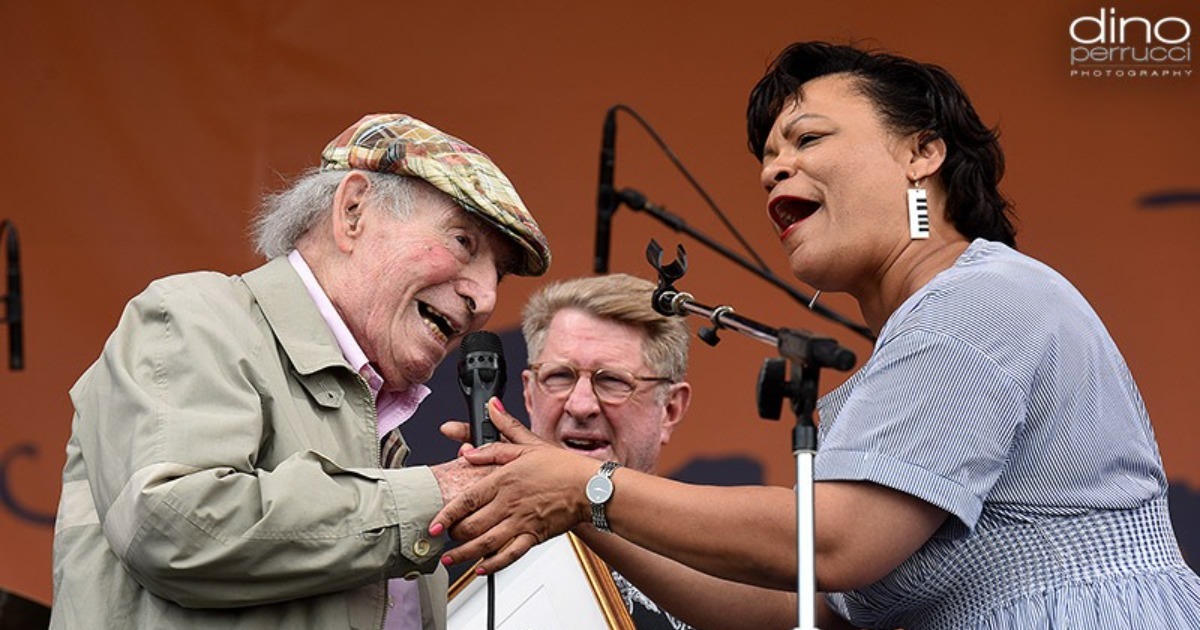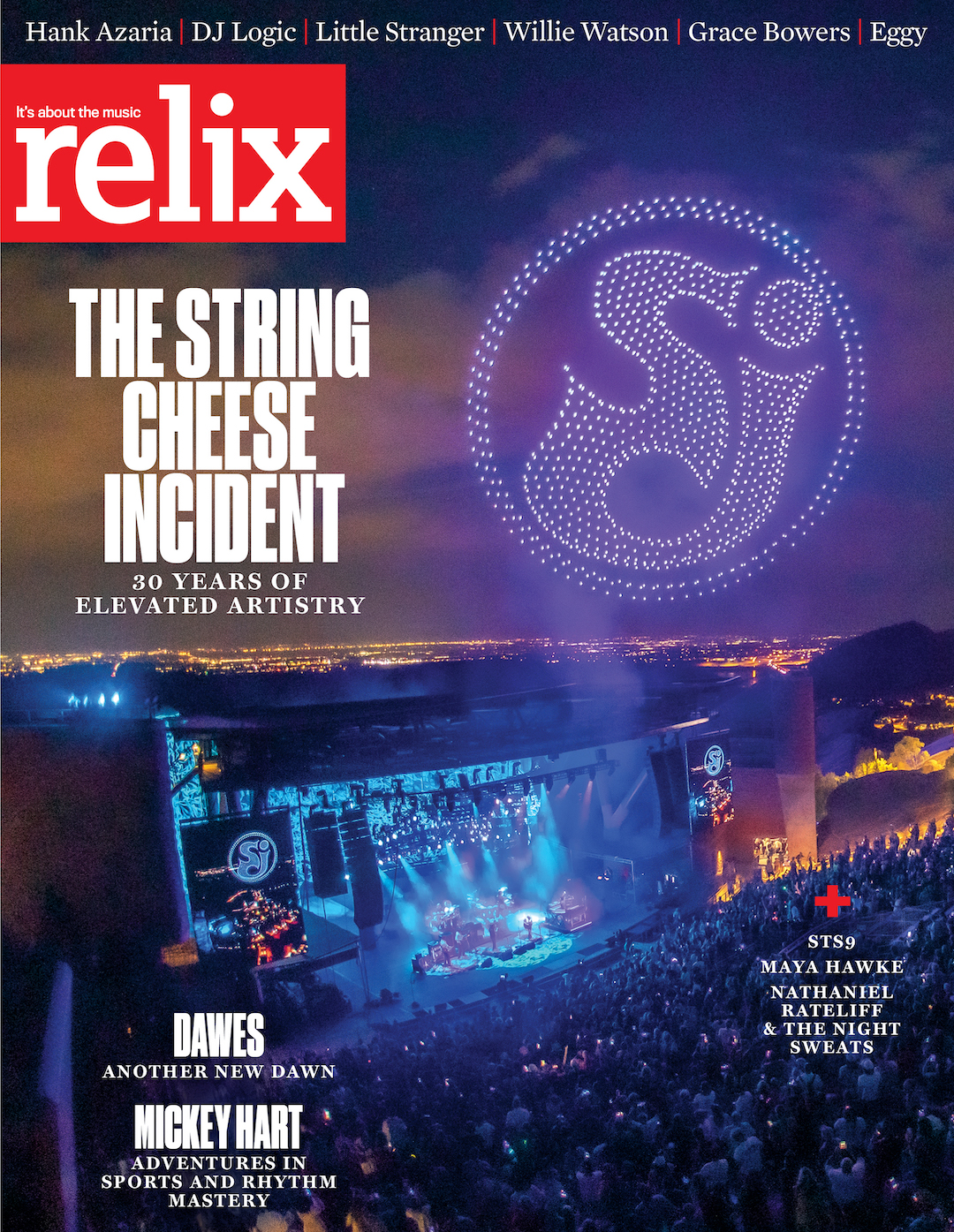In Memoriam: New Orleans Jazz & Heritage, Newport Folk and Newport Jazz Founder George T. Wein

George Wein receives the key to the city of New Orleans from Mayor LaToya Cantrell at Jazz Fest 2019, Photo by Dino Perrucci
George T. Wein, co-founder and creator of the New Orleans Jazz & Heritage Festival, Newport Jazz Festival and the Newport Folk Festival, died peacefully in his sleep on Sept. 13, 2021. He was 95.
Wein was a promoter, pianist, art collector and philanthropist, and for 70 years was one of the most influential presenters of music around the globe.
“I received an award from the APAP [Association of Performing Arts Presenters] for being a pioneer in changing the way young Americans listen to music in the summer,” Wein told Relix in 2014, recalling the origins of Newport Folk. “I’m very proud of that award, but I didn’t realize I was doing that when I was doing that. [Laughter.] We thought, ‘Why don’t we set up on the lawn and build a stage and play the music?; Festivals go back to medieval times; there’s nothing original about doing a festival. I guess this was the first time music was presented in a two-to-three-day period like that.”
Wein was born in Newton, Mass., on Oct. 3, 1925, to Jewish parents.
His father, Dr. Barnet Wein, was an ear, nose, and throat specialist. His mother, Ruth, was a homemaker. Wein started taking piano lessons at the early age of 8. He was later introduced to Earl Hines’ horn-like piano style and so began his life in jazz and music.
Wein performed in various jazz bands around Boston while still in High School in Newton. After one year in college, Wein was drafted into the Army. He said throughout his life that he got his greatest education and life lessons from being around fellow soldiers of many races, ages and faiths. After his honorable discharge from the Army, Wein returned to Boston University on the G.I. Bill and graduated from the School of Liberal Arts in 1950.
After Wein graduated at 25-years-old, he opened his very own jazz club, called Storyville, in Boston. The club featured emerging artists and world-renowned stars. He created a record label under the same name as his club and started recording some of the most respected in the live music scene at the time.
In 1954 Louis and Elaine Lorillard, socialites from Newport asked him to create something to liven up summers in the City-by-the-Sea. As a fan of the classical music festival in Tanglewood, Mass. Wein set to work.
He wrote in his memoir, “What was a festival to me? I had no rule book to go by. I knew it had to be something unique, that no jazz fan had ever been exposed to. I remembered my nights in New York City when I had started off in Greenwich Village at 8 pm, gone to Harlem, and ended up seven hours later at 52nd Street. I could never get enough jazz. I heard Dixieland, big bands, swing, unique singers, and modern jazz. If this is what I loved, then that’s what should appeal to any jazz fan. I’m sure that’s what directed my concept of the Newport Jazz Festival … They wanted to ‘do something with jazz’ in their community. I took that vague but earnest request and hatched the festival. There is no doubt that the driving force and inspiration behind the festival was Elaine … Louis provided the necessary financial support and local influence.” Wein did the rest, and he continued to make music history time and time again.
In 1959, Wein co-founded the Newport Folk Festival with Pete Seeger.
They later hired producer Bob Jones and presented the best musicians of folk, blues, and gospel, including Joan Baez, Bob Dylan, Peter, Paul & Mary and the Dixie Hummingbirds.
In recent years Newport Folk has welcomed artists like Dolly Parton, Deer Tick, Mavis Staples, Brandi Carlile, Jim James, Nathaniel Rateliff, Michael Kiwanuka, Rhiannon Giddens, The Decemberists, Jason Isbell, Alabama Shakes and the late John Prine.
It was on a Newport Folk stage in 1965 that Bob Dylan famously and infamously went electric.
Wein, who sensed the audience’s displeasure, asked Dylan to go back on stage and play some acoustic music. Dylan did as Wein requested. The set became known as one of the defining moments in 20th Century music.
After turning over the reigns of the Folk Festival to producer Jay Sweet in 2009, Wein attended every event excluding 2021’s Folk On, listening to old favorites and new music and enjoying the many surprise artist collaborations while marveling at the sold-out crowds. At 2021’s Newport Jazz Festival, Wein made a virtual appearance onstage via FaceTime, with artistic director Christian McBride holding his phone up to the main stage microphone.
In 1970, Wein also founded the New Orleans Jazz & Heritage Festival. He later turned over the project to his protégé Quint Davis.
“With the passing of the Civil Rights Acts of 1964, the South had opened up and there was a desire on the part of Southern cultural establishments to join the mainstream of American art and entertainment,” Wein recalled on Jazz Fest’s first iteration in his memoir.
In 1975 Wein and promoter Dino Santangelo launched the KOOL Jazz Festivals, which featured R&B, jazz, and soul artists on the same stages in large arenas across the country. Jazz stars McCoy Tyner, Quincy Jones, Freddie Hubbard, Donald Byrd and Cannonball Adderley played on the same bill with the Ohio Players, the O’Jays, The Isley Brothers and B.B. King. Those concerts became more than just music events. They were celebrations of Black music that are now revered as major cultural events.
In addition to festivals, the Newport Festivals Foundation began sending its Jazz Assembly Band into schools to share the rich history of jazz. Since its inception in 2016, the foundation has given access to music to more than 35,000 students. The foundation also provides instruments to schools, free content for music teachers, financial relief to hundreds of musicians impacted by the pandemic and over 100 grants for music education programs.
In his 2003 biography, Myself Among Others: A Life in Music, Wein wrote, “whether it’s one of the many festival producers throughout the world or the concert promoters, or the individual nightclub owners struggling night to night – their contributions are essential to the history of this music. I’m glad to have been part of this process: in the development of the jazz festival, the acceptance of this music as art, the efforts to bring jazz to a wider audience worldwide …”
In 2014, the New Orleans Jazz & Heritage Foundation opened the George and Joyce Wein Jazz & Heritage Center, which offers free music classes in the city’s Tremé section.
Wein desired that any memorial tributes be made in the form of charitable donations to Newport Festivals Foundation, the 501 (c)(3) non-profit corporation he established in 2010 to preserve the Newport Jazz and Folk Festivals. Donations can be made here or by mail at Newport Festivals Foundation, PO Box 650, Essex, MA 01929.
George Wein is survived by his nieces Margie Wein of Brooklyn, N.Y., and Carol Wein of Watertown, Mass.; sister-in-law Theodora McLaurin of Chestnut Hill, Mass.; and long-time friend, Dr. Glory Van Scott of New York City.
George and Joyce had no biological children, but he nurtured and loved dozens upon dozens of festival “children and grandchildren” worldwide.



















